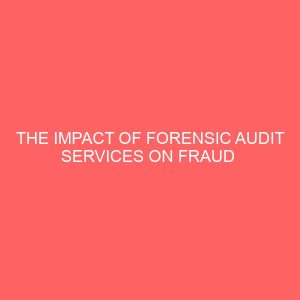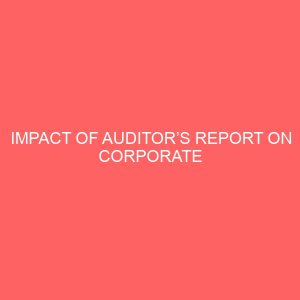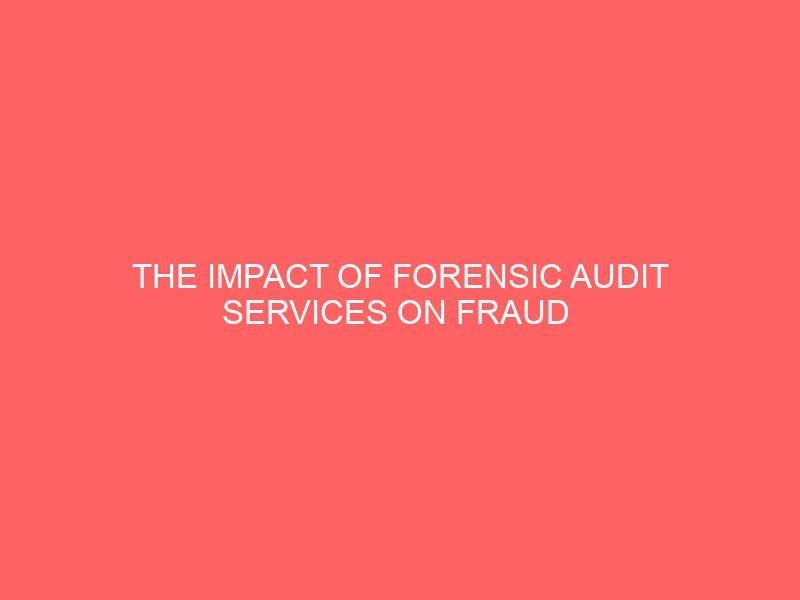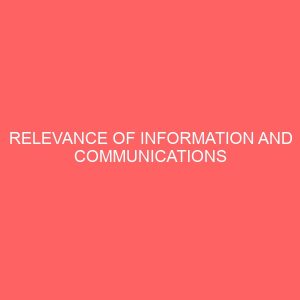Description
CHAPTER ONE
INTRODUCTION
1.1 Background of the Study
This research work is on the impact of forensic audit services on fraud detection among commercial banks in Nigeria. The banking sector in Nigeria has endured some difficulties in the past few years as evidenced by the recent scandals within the industry. Akelola (2015) points out that the widespread fraud in the banking sector is a major problem and it is becoming a concern for many Nigerians because of the ease with which individuals can commit it and the lack of sentencing of the involved persons by the courts.
In Nigeria, the continued fraud incidents among banks has been the result of undetected fraudulent activities which lead to the increasing mismanagement of funds, which is then detected so late that it’s irreparable. Lack of disclosure of insider borrowing and mismanagement of funds for long periods will, over time, lead to falsified account books and later on the inability of the banks to pay their short-term and long-term liabilities. According to EFCC, the increasing rates of fraud in the banking sector are also attributable to the unwillingness of banks to effectively address fraud, inadequate laws, particularly concerning fraud, making courts fail to convict the involved individuals, and the lack of independence of the auditing role (Akelola, 2015). The increased incidence of fraud in commercial banks has posed a threat to traditional auditing as a branch of the accounting profession resulting in the question as to whether compulsory auditing is playing the role of early fraud detection and at the end, further prevention of more losses. Central Bank had placed some regulations to stop this from further occurring, but despite this, another scandal happened under the regulator’s nose. According to Gitau & Gitahi (2016), the long history of bank fraud is resulting in a situation where stakeholders are starting to lose their trust in the industry. Fraud leads to a loss of credibility and a crisis of confidence among the public, and it raises questions on the going concern of the commercial banks in Nigeria.
1.1.1. Forensic Audit Services
The word forensic refers to the application of knowledge to legal problems such as crime (Gray, 2008). Forensic auditing as a service, therefore, puts together auditing, accounting, investigative, and legal skills to find out whether accounting transactions concur with the regulatory requirements. All this is done to ascertain whether there has been the occurrence of any fraud. Forensic auditing involves gathering, verifying, processing, analyzing, and reporting on data with the aim of obtaining facts and evidence (Mohdi & Mazni, 2008) in a predetermined context in the area of financial irregularities. The Institute of Forensic Auditors (IFA) defines a forensic audit as an activity that involves the collection, verification, analysis, and reporting of data with the aim of collecting evidence to use in a court of law. The Institute of Certified Public Accountants of Nigeria (ICPAN) points out that the field of forensic auditing focuses on gaining an understanding of a fraudster’s mind in efforts to establish reasons for committing fraud as well as detecting them. Vukadinoc, Knezevic, & Mizdrakovic (2015) state that the focus of forensic audits is the investigation and detection of fraud and it involves two primary activities: investigating the fraud and providing litigation support services in the court of law.
Forensic audit evidence gathered could be presented in a court of law in the case of litigation and could also be used to correct a situation that could lead to fraud. Forensic audit service is useful as both a reactive and a proactive measure in curbing fraud in an organization. Proactive forensic auditing seeks out mistakes and deviant financial transactions before they graduate into fraud. According to Najnike, Dube, & Mashanyanye (2009), the proactive approach searches for the indicators of fraud or red flags and uses the philosophy that “catch fraud before it catches you”. It may revolve around a statutory audit, diagnostic tools, and regulatory compliance. A statutory audit is done by an independent professional on the financial statements of a company that has been compiled by the management with the aim of expressing an opinion pertaining the position, current situation and financial performance by the accounting principles.
Regulatory compliance is testing an entity’s compliance with the various laws and regulations applicable to it and preparing a written report. Diagnostic tools have their application in determining the ability of the various components and procedures put in place to be functional and enable investigation of allegations.
Reactive forensic auditing investigates any suspicion of fraud so as to prove or disapprove the accusations and if the suspicion is confirmed the person involved are identified, the findings are supported by concrete evidence, and a presentation is made in an acceptable form in any disciplinary or criminal proceedings. Reactive forensic auditing involves: working relations with the agencies in charge of investigating and prosecuting, authorization and control of audit investigation, documenting the relevant information and protecting all records pertaining to the case, evaluating the evidence to assess the sustainability of the case, the relevant legal advice where necessary, reporting the overall findings in a format that meets legal requirements.
According to Onodi, Okafor, & Onyali (2015), the need for forensic investigations arises from the fact that the internal and external audit functions of organizations have been failing in the detection of corporate fraud. For instance, the traditional audit committees do not have the ability to uncover facts and hidden aspects of fraud, the rotation of the statutory auditors occur through collusion and manipulation, and most auditors do not undergo a thorough scrutiny of their qualifications. Therefore, forensic auditing skills are critical in uncovering and establishing the occurrence of financial fraud and crimes (Alao, 2016).
1.1.2 Forensic Audit Services and Fraud Detection
Financial fraud refers to committing illicit activities with the purpose of acquiring riches either as an individual or as a group, and it violates the existing legislation or accounting policies governing the economic activities and administration of the organization (Yio and Cheng, 2004). The actual fraudulent activity is hard to observe. Fraud only shows up through various signs in an organization these signs may also not indicate the occurrence of fraud as it may be a human error. Kenyon & Tilton (2015) categorizes fraud into four: asset misappropriation, fraudulent schemes in financial reporting, obtaining revenues and assets through fraud, and in expenditures and liabilities. Some obvious manifestations of fraud are a delay in submission of returns, late preparation or failure to prepare bank reconciliation statements, failure to segregate duties, the lifestyle of promoters of an organization or its directors and some key employees, and repeated internal control lapses and inability to adhere to norms of corporate governance. Albert (2005) states that at times fraudsters hide fraud in human made mistakes making it hard for forensic auditors to detect them.
The success of fraud detection is in the appropriate identification of red flags by the forensic auditor (DiNapoli, 2016). A red flag refers to an anomaly in business activities and human behavior. However, their presence is not evidence that an illegal act has happened, but they simply indicate that the potential for fraud is high to warrant an investigation. DiNapoli (2016) gives examples of red flags for fraud, the most common being the behavior of employees and management. Also, red flags are observed in various organizational activities such as payroll, procurement, and in accounts receivable management. The Association of Certified Fraud Examiners (ACFE) points out that 64% of fraud perpetrators exhibit behavioral red flags, the most common being unexplained wealth and living beyond means. The expectation is that the frequency of occurrence of these red flags will reduce when forensic audit services are applied in an organization.
Fraud detection is not the role of independent auditors, but it is up to the management to develop strong internal controls that will aid in the detection of fraud. However, with the growth of technology and size of organizations, fraud has also become too complex to be effectively addressed by management. White collar crime has become rampant in recent times, and the perpetrators do not face any legal action because of a lack of evidence (Ogutu & Ngahu, 2016). Fraud is becoming a concern in the commercial banking sector in Nigeria because the statutory audits have failed to uncover or prevent frauds. As a result, the four banks (Access, Keystone, Polaris and Fidelity Bank) and other organizations such as Nigeria Airways have resorted to forensic audit services to uncover fraud and mismanagement (Ogutu & Ngahu, 2016). Popoola, Che-Ahmad, & Samsudin (2014) point out that the adoption of forensic auditing skills in every sector of the economy significantly enhances the detection of fraud.
1.1.3 The Banking Sector in Nigeria
In Nigeria, there are 23 commercial banks (CBN, 2019). The Central Bank of Nigeria (CBN) is charged with the supervision of the banking industry. Its role is to review banking laws and policies, issue licenses to financial service providers and banking agencies, and exercise oversight authority over the industry.
The Nigerian Banking sector has been through two main waves of crisis and many of them collapsed. The number of failed banks as at 1998 was 22 (Akelola, 2012) and the some of the reasons for the collapses were mismanagement in the disbursement of loans, weak legal and regulatory controls, adverse selection of customers resulting in non-performing loans. Therefore, unsound banking practices, fraudulent practices by the managers, employees, and even the Board of Directors (BOD) have been a major problem in the Nigerian Banking sector.
With the growth of commercial banks, the number of shareholders and separate ownership from the management has been on the increase which increases the risk of management committing fraud and malpractices. Therefore, this has necessitated the regular use of forensic auditing services on both the non-financial and the financial report. In 2014 the Nigerian commercial banks lost $9.4 million to fraud in just six months. EFCC report cited credit card fraud, forgery of documents, and online fraud as the modes through which the banks lost money. This study focuses only on the commercial banks in the Nigerian economy with concern being how forensic auditing as a tool for detection can be used to better the services offered the Nigeria commercial banks.
1.2 Research Problem
The role of the CBN in bank supervision is to develop and review laws and guidelines that govern the banking sector and exercise oversight over all players in the banking sector. In the recent past, there has been a rampant increase in the closure of bank due to fraudulent activities like fraudulent financial reporting, forgery, corruption, and embezzlement of funds by the management and other bank officials. Since CBN is only tasked with acting as an oversight body for the banking sector, bank managers and employees have found a loophole to conduct fraudulent activities and later cover up their tracks through internal auditors or even going as far as colluding with external auditors.
Banks are expected to carry out their responsibilities with sincerity of purpose devoid of any fraudulent activities (Gitau & Njenga, 2016). However, the sector has been on the spotlight for the many allegations of fraud and some have been put under receivership even to the extent of closure. The public has been concerned why these frauds have not identified and prevented and this points out the failure of the management in setting up strong internal control systems as well as laxity in the regulatory bodies. According to Gitau & Njenga (2013), EFCC is not proactive in the fight against bank fraud and few individuals have been prosecuted over fraud charges.
Statutory audit in banks appears to have failed by showing little concern and reflective attitudes towards fraud-fighting in Nigeria thereby giving the inappropriate public assurance to handling corruption and fraud. According to Mahinda (2012), the continued frauds in the Nigerian banking sector erodes investors and consumer’s confidence as well as being a threat to any potential investors. External auditors in Nigeria have been heavily criticized for the fraud cases, and the public seems to have lost faith in external auditing as a tool to detect fraud in Nigerian companies (Omwong’oa, Mamati, & Ongocho, 2010). There then seems to be a gap that is taken advantage of by the managers, directors, and employees of Nigerian banks. Fraud is perpetrated under the supervision of the management and the internal auditors of banks. According to Peter, Aliyu-Dadi, EbongInyang, & Gabriel (2014), there is a need to come up with different means of tackling fraud in the commercial banking industry.
There are previous local studies carried out by scholars on fraud and the Nigerian commercial Banking sector. Wanemba (2010) carried out a study that sought to establish the challenges of fraud faced by commercial banks in Nigeria and to identify the strategies that the banks use to combat fraud. Wanyama (2012) in his study that sought to determine the effectiveness of fraud response strategies adopted by Cooperative Bank of Nigeria found out that bank applies both proactive strategies such as data analysis and continuous auditing techniques to deter fraud. Akelola (2012) conducted a study whose aim was to establish the characteristics of fraud and the fraud management approach in the Nigerian banking sector. Waigumo (2012) also carried out a study that sought to investigate the effect of fraud risk management practices on fraud in Commercial Banks in Nigeria and states that fraud risks pose a great threat to the Nigerian Commercial banking sector. None of these studies pay attention to the role of forensic audit services on fraud detection. This is the basis of this study and it seeks to fill the existing knowledge gap by answering the question: Are forensic audit services useful in the detection of fraud in the Nigerian Commercial Bank Sector?
1.3 Research Objective
To ascertain the effect of forensic audit services on Fraud detection in Nigeria Commercial Banks
1.4 Value of the Study
The findings of this study are likely to impact positively on the following areas. CBN as the regulator will have to approve the role of forensic auditing and the use of forensic audit information in the adjudication of suspected criminals in court cases. These cases are usually taken for granted, as they drag in court taking years before anybody is made responsible for the fraudulent acts to the extent that judges are offered bribes to do away with the cases. Foreign and domestic investors will be comfortable to increase the number of investments and even sustain the investments they already have in Nigerian banks. With the assurance that fraudulent activities will be detected earlier, and the ones responsible held accountable. Investors will learn to trust the system, knowing that both the government and regulators are taking care of their investments as if it was their own.
The study will also help improve or contribute to the already existing body of knowledge, assist other researchers in understanding the effect of forensic auditing on fraud detection. The study will also help the management of commercial banks to identify the areas that are most vulnerable to fraud and therefore, the management can gain the knowledge on how to detect fraud and come up with measures that reduce the chances of fraud occurring.








Reviews
There are no reviews yet.